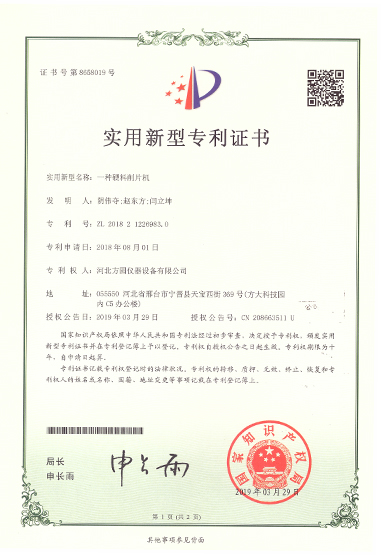Tensile Strength Testing Equipment for Accurate Material Performance Evaluation and Analysis
The Importance of Tensile Strength Tester Machines in Material Testing
Tensile strength tester machines, also known as tensile testers or universal testing machines (UTMs), play a critical role in the field of material science and engineering. These machines are designed to assess and quantify the tensile strength of various materials, which is a fundamental property that determines how a material will behave under tension. This article will explore the significance of tensile strength testing, the various applications of these machines, and the technological advancements that are enhancing their capabilities.
Understanding Tensile Strength
Tensile strength refers to the maximum amount of tensile (pulling) stress that a material can withstand before failure. It is a crucial measure of a material's ability to resist deformation and elongation when subjected to external forces. The process of tensile testing involves applying a uniaxial load to a sample until it breaks, allowing engineers and researchers to measure key parameters, such as yield strength, ultimate tensile strength, elongation, and modulus of elasticity.
The Role of Tensile Strength Tester Machines
Tensile strength tester machines are equipped with sophisticated sensors and software to precisely measure the force exerted on the material and the corresponding elongation. The machines typically have two gripping mechanisms one that holds the stationary end of the material sample and another that pulls the opposite end. As the machine applies tensile force, it records the stress-strain curve, which provides insight into how the material behaves under load.
These machines come in various configurations, from simple analog devices to advanced digital units that can interface with computers for data analysis. The range of capabilities allows for the testing of different materials, including metals, polymers, composites, and textiles, making tensile strength tester machines essential tools in manufacturing and quality control processes.
Applications Across Industries
tensile strength tester machine

Tensile strength testing is vital across numerous industries, including construction, aerospace, automotive, and biomedical engineering. In construction, for example, it is crucial to ensure that materials like steel and concrete can withstand the forces exerted on them, ensuring the safety and longevity of buildings and infrastructure. Aerospace components must meet stringent standards for tensile strength to guarantee performance under extreme conditions.
In the automotive industry, tensile testing helps in selecting the right materials for safety and structural integrity. With the growing emphasis on lightweight materials to improve fuel efficiency, knowing the tensile strength of composites and alloys is more critical than ever. Additionally, in the biomedical field, tensile testing is used to evaluate the materials used in medical devices and implants, ensuring they possess the requisite strength and flexibility for optimal function.
Advancements in Technology
Recent technological advancements have significantly improved the accuracy and functionality of tensile strength tester machines. Modern machines feature advanced load cells and extensometers, allowing for more precise measurements. Furthermore, the integration of software that automates data collection and analysis has streamlined the testing process, reducing human error and increasing efficiency.
Moreover, some machines are now equipped with capabilities for non-destructive testing (NDT), enabling engineers to evaluate materials without causing damage. This is particularly useful in industries where the integrity of materials is paramount. Artificial intelligence and machine learning are also beginning to play a role in interpreting tensile test results, providing insights that can lead to better material selections and innovations.
Conclusion
In conclusion, tensile strength tester machines are essential tools in material testing, providing valuable data that informs design, safety, and performance across diverse industries. As technology continues to evolve, these machines will become even more sophisticated, allowing for more comprehensive testing methods that will aid in the development of stronger, more reliable materials. The ongoing research and development in tensile testing not only enhance our understanding of materials but also contribute to technological advancements that impact our daily lives. Whether it’s in the construction of buildings, the manufacturing of vehicles, or the development of medical devices, the importance of tensile strength testing cannot be overstated.
-
Why the Conductor Resistance Constant Temperature Measurement Machine Redefines Precision
NewsJun.20,2025
-
Reliable Testing Starts Here: Why the High Insulation Resistance Measuring Instrument Is a Must-Have
NewsJun.20,2025
-
Flexible Cable Flexing Test Equipment: The Precision Standard for Cable Durability and Performance Testing
NewsJun.20,2025
-
Digital Measurement Projector: Precision Visualization for Modern Manufacturing
NewsJun.20,2025
-
Computer Control Electronic Tensile Tester: Precision and Power for the Modern Metal Industry
NewsJun.20,2025
-
Cable Spark Tester: Your Ultimate Insulation Assurance for Wire and Cable Testing
NewsJun.20,2025
 Copyright © 2025 Hebei Fangyuan Instrument & Equipment Co.,Ltd. All Rights Reserved. Sitemap | Privacy Policy
Copyright © 2025 Hebei Fangyuan Instrument & Equipment Co.,Ltd. All Rights Reserved. Sitemap | Privacy Policy
